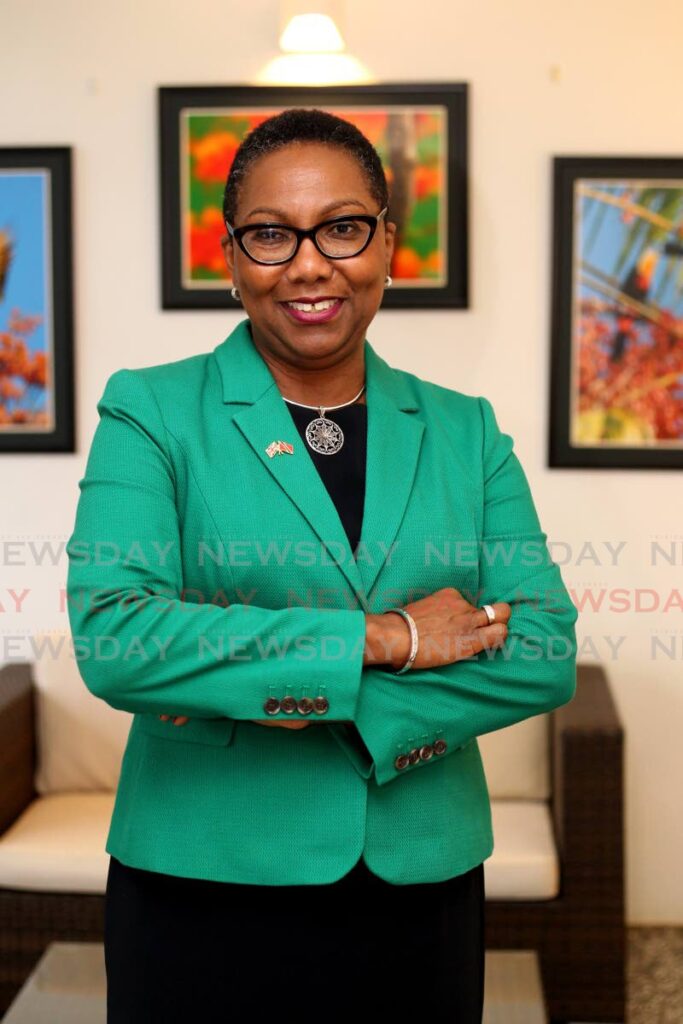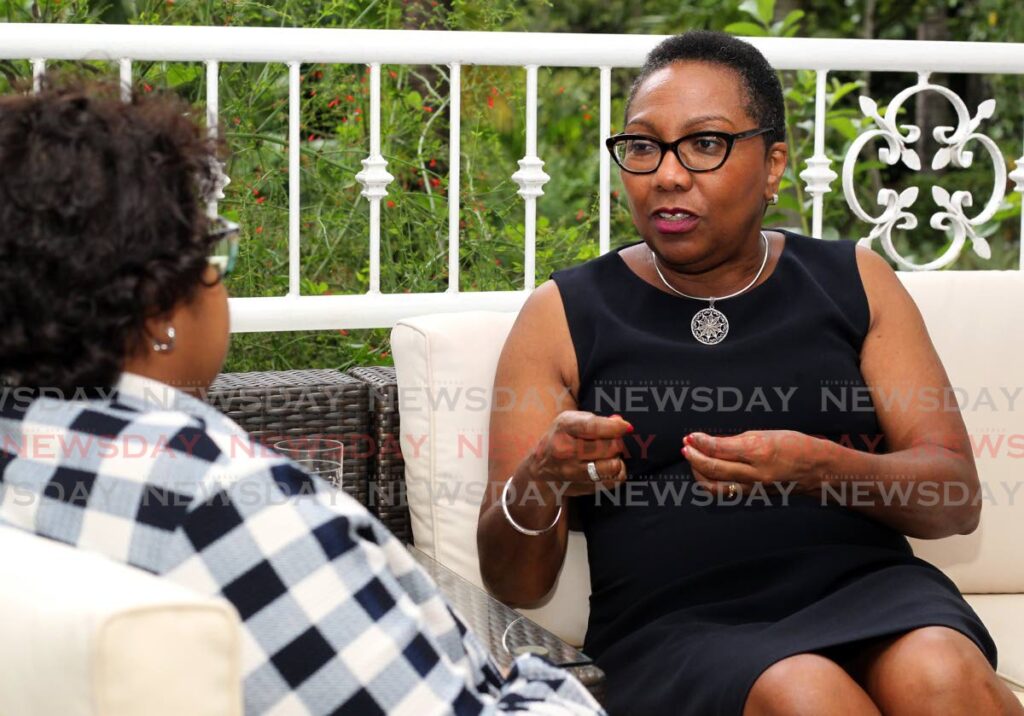Trini-born UK special envoy advocates for gender equality

One occasionally hears the hint of a Trini accent from the UK’s special envoy for gender equality, Alicia Herbert, OBE, as she talks about her journey from TT to becoming the director of the Education, Gender and Equality Directorate (EdGE) at the UK’s Foreign, Commonwealth & Development Office (FCDO), and what she hopes to accomplish working with the TT and UK governments.
She visited Trinidad on October 10 and Tobago on October 11 to meet with stakeholders in both islands, local partners of the UK Embassy, students of St Francois Girls’ College (which she attended), and also spoke at an International Day of the Girl conference in Tobago on October 11. She said she was excited when invited to visit, as she had not been back for almost ten years.
“Having been born and grew up here, coming back on an official visit is an interesting prospect. But at the same time, hopefully what I can do is lend my voice to issues that are important for both the TT government and the UK government, given that I grew up here and have an understanding of the place.
“It’s nice to be back here soaking up the vibrancy and the colour and the accents and that sort of thing. I love the way Trinbagonians relate to each other: there’s a sort of brutality in the honesty, but it’s always cloaked in a joke, so just hearing all of that, it’s quite nice.”
Herbert grew up in Carenage, and went to Sacred Hearts Girls' RC and St Francois Girls' in Belmont. She taught at Fatima College for two years before going to Canada at 20 to study economics and then development. She went to Cambridge University on a Commonwealth scholarship to do postgraduate work in international development, then did a master’s degree in social policy and planning at the London School of Economics.
Between obtaining her bachelor’s and master’s degrees, Herbert worked in Zimbabwe as a teacher in the mid-80s. She said it was a fantastic experience in that she had to fend for herself in a time before easy connectivity through the internet, when it took a month for a letter to come from Zimbabwe to Trinidad, and a month to get back.
It was there that she met her husband, who was working for an engineering firm in Zimbabwe at the time. He is from Ghana, and they have two children who are now young adults living in the UK.
After graduating from the LSE, Herbert worked at the World Bank with a well-known anthropologist on issues of gender, Caroline Moser, for three years. She then worked on social policy in the UK and Europe, before joining the British government’s then Department for International Development, now the Foreign, Commonwealth and Development Office since a merger in 2021, to work on poverty reduction, gender equality, HIV and AIDS.
“I was posted to three different countries in Africa: Mozambique, Nigeria and Sudan. I came back to the UK in 2016 and started working specifically on girls’ education, but then within the last 1.5 years or so my remit was expanded, as I was promoted, and now I’m the director for the Education, Gender and Equality Directorate (EdGE) so taking on a wider brief, as well as (being) the gender envoy.”
She was awarded an Order of the British Empire (OBE) in December 2020 for her services to development.
Herbert said there wasn’t one particular point where her professional career began to focus on women, as the idea of being independent was inculcated in her throughout her childhood, both at home and at school.

“I grew up with a mother and with parents who were very clear about equality between their sons and their daughters. With a mother who was very strong, very financially independent and always wanted her daughters to be, I just knew that economic and financial independence overall as a woman was going to be important to me.”
“I was in all-girls' education all my life, and when I look back at it, we were just finding our way about how to be a young woman and how we'd show up in the world as well. We were navigating all kinds of things, and as a young woman between the ages of 11 and 18, being in an all-girls' school with impressive female teachers is quite an empowering experience. It was absolutely part and parcel of who we are on those sorts of issues.”
She said it was empowering growing up in TT, in an environment where there is a huge amount of diversity, whether in religion or ethnicity, and where despite all of the challenges around gender equality, “You have women who look like you in senior positions, and I think that’s quite encouraging in terms of what you can achieve yourself.”
She said she carried this attitude to varying degrees and intensities all the way through different parts of her career, from specialising in gender equality during her master’s degree to working with Moser with women in poor communities in Latin America and Africa, as part of her work in Africa, and gaining greater prominence in the past four-six years, when she worked in issues of girls’ education and now as the special envoy for girls.
“I guess there are moments in your life when things come together, stuff has been there and dormant and latent all the time, and then there’s something that happens – it just sparks, and a number of things can come together at the same time.
“You don’t necessarily have to start out with a gender focus. You could do economics, you could be in a medical background, and you say there are certain groups where you want to centre them, whatever you do, because you recognise there’s an inequality. It doesn’t matter what profession you’re in, you can take these issues on board. It’s not about gender studies per se, it's about the lens you put on things.”
Herbert said her work spans all levels of society, from the government-policy to the grassroots level. While the office did a lot of work in terms of the British government’s policies and strategies, she said, it encouraged other countries to use evidence to generate their own policies.
“It’s about making available information about what works and what doesn’t work, about policies that have been tried and tested in other places, so I think we can play that facilitating role, as well as providing technical assistance for the development of policies.
“We also spend a fair amount on aid and therefore we get involved in the hard delivery of projects on the ground. In various parts of the world, we have projects in education, or supporting women's rights organisations, or preventing violence against women and girls. We’ve really been working concretely on the ground with a range of NGOs, with government, in communities, with a range of actors, to really deliver and shift attitudes and approaches on the ground as well.”
Herbert said during her visit she met with NGOs from both islands that the UK High Commission is currently supporting with projects, as well as Gender and Child Affairs Minister Ayanna Webster-Roy.
“What was clear is that while the government is leading and doing certain things, it clearly has a relationship with CSOs (civil-society organisations) and what they do and deliver. I’m here to learn and then try to find ways in which what we're doing can help to further their agendas.
“It’s about NGOs concerned with young people and ensuring their voices are heard and helping to shape policy and interventions, it’s about the situation with LGBTQI rights in TT and how to work in that space. It’s about the use of media and messaging around children and children's rights.
"Those are the sorts of conversations we’ve had, with them giving me their perspectives on the challenges, but also, more importantly, talking about how they are part of the solution, and what are they doing to change the course for children, young people, women, and other groups in TT.”
She said while the current downturn in the UK economy could have implications for her organisation’s aid budget, the UK was still one of the major donors in the world. Because of its per-capita income status TT is not eligible for aid, but can be given non-official development assistance. She said the relationship with TT would be one of sharing evidence, ideas, experience and technical assistance and support, with small pots of money attached.
While she understood the rich diversity of TT led to differing views on the provision of comprehensive sexual education in schools and access to sexual and reproductive health and rights, she said the UK government was clear about its policy that people should have access to their rights.
“We think the provision of those services helps to unleash women’s potential, and if women are winning, everyone’s winning. But in my role, and working globally with a range of partners, I think we have to meet partners where they are. We’ve got to begin to have these conversations and think about how do those issues play out in the space in TT?
“If you fundamentally believe in people having human rights, people having freedom to express themselves is a starting point, and then you can build a conversation on that.
"Being adversarial doesn’t get you very far. You’ve got to find common ground, consolidate, and build, because these are very tricky issues and many times deep-seated, deep-rooted, in the way in which people think about and react to them, and I think many times it’s a reasonably slow process.”
Herbert noted that the UK government recognised there are currently systemic attempts globally to roll back on women's rights. She said this strategic objective was being addressed through legislation, diplomatic tools, aid, the building of a coalition to understand the phenomenon, and other measures.
Climate change was another issue of importance, Herbert said, as internationally it was shown that women and girls were disproportionately adversely affected by disasters, whether natural or manmade.
Another issue of importance was displacement, both internal and external, and Herbert said she would be examining issues with respect to migrant women in TT.
TT has always been part of her life, she said: part of her family lives here, and she would always want a positive TT.
“At the moment, I think, like so many other parts of the world, it’s a tough time on the economy. Coming out of the pandemic and two years of lockdown was quite difficult. So I guess what would be my hope would be that TT recovers and finds its groove again post-covid.
"As the world around us changes globally, not only just post-covid, there are a number of things that are happening where we can reposition ourselves, continue to build a prosperous nation and one that really truly respects the rights of all people in what is a really diverse nation.”

Comments
"Trini-born UK special envoy advocates for gender equality"